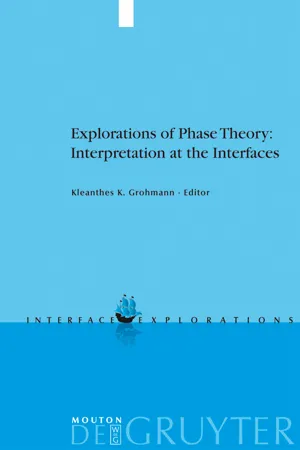
- 282 pages
- English
- PDF
- Available on iOS & Android
Explorations of Phase Theory: Interpretation at the Interfaces
About this book
Over the past decade, many issues leading towards refining the model have been identified for a theory of syntax under minimalist assumptions. One of the central questions within the current theoretical model, Phase Theory, is architectural in nature: Assuming a minimal structure of the grammar, how does the computational system manipulate the grammar to construct a well-formed derivation that takes items from the mental lexicon to the interpretive interfaces? This collection addresses this issue by exploring the design of the grammar and the tools of the theory in order to shed light on the nature of the interpretive interfaces, Logical Form and Phonetic Form, and their role in the syntactic computation.
The chapters in this volume collectively contribute to a better understanding of the mapping from syntax to PF on the one hand, especially issues concerning prosody and Spell-Out, and semantic interpretation at LF on the other, including interpretive and architectural issues of more conceptual nature. Apart from careful case studies and specific data analysis for a number of languages, the material contained here also has repercussions for Phase Theory in general, theoretical underpinnings as well as modifications of syntactic mechanisms.
Frequently asked questions
- Essential is ideal for learners and professionals who enjoy exploring a wide range of subjects. Access the Essential Library with 800,000+ trusted titles and best-sellers across business, personal growth, and the humanities. Includes unlimited reading time and Standard Read Aloud voice.
- Complete: Perfect for advanced learners and researchers needing full, unrestricted access. Unlock 1.4M+ books across hundreds of subjects, including academic and specialized titles. The Complete Plan also includes advanced features like Premium Read Aloud and Research Assistant.
Please note we cannot support devices running on iOS 13 and Android 7 or earlier. Learn more about using the app.
Information
Table of contents
- Frontmatter
- Contents
- Exploring interfaces
- Intermodular argumentation and the word-spell-out-mystery
- On bare prosodic structure and the spell-out of features
- Spell out before you merge
- On the derivation of the relation between givenness and deaccentuation: A best-case model
- Phase theory, linearization and zig-zag movement
- Surviving reconstruction
- On the interface(s) between syntax and meaning
- Dynamic economy of derivation
- The conceptual necessity of phases: Some remarks on the minimalist enterprise
- Backmatter